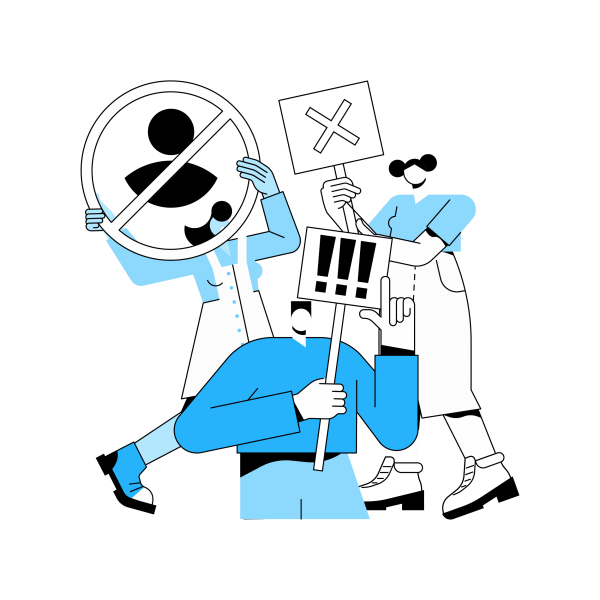Your cargo might be cleared. But is your customer?
We all know shipments move fast, but mistakes move faster. And when it comes to trade compliance, one missed name on a denied party list can bring everything to a halt.
Denied party screening isn’t just a legal formality. It’s your line of defence against doing business with restricted parties, individuals, companies, or even governments, that could land you in serious trouble with authorities like the U.S. Department of Commerce or the Office of Foreign Assets Control (OFAC).
In this article, we’ll explain what it is, how the screening process works, why it’s essential, and how you can stay ahead of ever-changing watch lists without slowing down your business.
What is a denied party list?
Every country has its own version of the same list – a “Do not do business with these people” list.
These are known as denied party lists, or restricted party lists. They’re compiled by government agencies such as the U.S. Department of Commerce, the OFAC, and the United Nations to flag individuals, companies, and organizations involved in activities like arms trafficking, money laundering, terrorism, or violating export regulations.
If a name on that list shows up in your export transaction, and you don’t catch it? You may be potentially violating export control laws, even if you didn’t mean to.
Customs authorities, banks, air carriers, and logistics providers all rely on these restricted party lists to stay compliant. If you’re involved in global trade, you’re expected to continually check and monitor.
The challenge is that these lists don’t stay the same. They can change overnight or even multiple times in a single day as governments add new names, companies merge, or investigations reveal hidden connections. A business partner that’s cleared today might appear on a Denied Persons List tomorrow.
This is why denied party screening isn’t optional. It’s how you keep shipments moving, protect your export privileges, and avoid costly compliance mistakes.
Who should be screened?
Basically, everyone you do business with.
Denied party screening isn’t just for your customers. It applies to suppliers, freight agents, customs brokers, third-party contractors, and even employees and board members in some cases. If they’re part of your business transaction, they should be part of your screening process.
That includes:
- Buyers and sellers
- Carriers and consolidators
- Agents and intermediaries
- Financial institutions and insurance providers
- Visitors to your facilities
In the case of air carriers and freight forwarders, even when they are not directly exporting goods, they are still liable under export control laws or trade compliance obligations. This is especially applicable when they are working with controlled products, foreign entities, or operating in or through countries that are subject to sanctions.
And it’s not just a one-time check. Names change. Ownership structures shift. Screening should occur at onboarding, before every shipment, and whenever there is a change.
If you’re moving cargo across borders, everyone in the chain matters. And so does knowing who they really are.

How does denied party screening work?
At its core, denied party screening is matching names. But it’s never as simple as a quick Google search.
The screening process begins by comparing the names of all parties involved in your business transaction against official watch lists and restricted party lists. These come from agencies such as the Bureau of Industry and Security, OFAC, the United Nations, and the EU Consolidated List – just to name a few.
However, names aren’t always straightforward. Companies have multiple subsidiaries, people use aliases, and spellings vary across languages. One John Smith in Dubai might be fine; another might be on the Denied Persons List for violating export regulations. These lists can be updated multiple times a day.
That’s why leaders in global trade compliance use automated screening tools. Instead of your team sifting through dozens of blacklists manually, the software checks thousands of records in seconds, flagging matches, reducing false positives, and building an audit trail in case regulators come knocking.
The result?
- Faster, more accurate checks
- Fewer shipment delays
- Less risk of accidental compliance violations or losing export privileges
The next time you file an air waybill, you can be confident the people behind it are as cleared as your cargo.
Best practices for denied party screening
It’s not enough to check a list once and hope for the best. If you want to protect your shipments, your export privileges, and your reputation, these best practices matter.
Screen every party, every time
Don’t just screen your customers. Screen suppliers, freight agents, intermediaries, and anyone else involved in your business transactions. One unchecked partner can lead to a compliance violation that ripples through your entire supply chain.
Screen early and often
Don’t wait until the cargo is on the tarmac. Run restricted party screening during onboarding, before every shipment, and any time key data changes, such as a new address or updated ownership structure. This automated rescreening closes the gaps.
Use automation, and your team will thank you
Manually checking dozens of watch lists, like the OFAC SDN list or the Bureau of Industry and Security’s Entity List, is slow and error-prone. Smart companies use software that updates lists continuously, flags matches, and keeps you in line with global export control law, while your team focuses on moving cargo, not chasing names.
Keep an audit trail
No one wants to face the regulator empty-handed. Save time-stamped records of who you screened, when, and what you did about it. A solid audit trail can mean the difference between proving compliance and paying massive fines.
In short? Treat denied party screening as part of your everyday trade compliance process, not an afterthought. It’s how the best in global trade avoid costly surprises.

What tools help with denied party screening?
Sure, you could try to keep up with every restricted party list manually. However, with global sanctions, changing export control laws, and daily-updated watch lists, most companies recognize that it’s a losing game.
Instead, they rely on restricted party screening software or integrated trade compliance solutions that do the heavy lifting.
Some popular options in the market include:
- Castellum.AI: a useful tool for checking thousands of global sanctions lists
- SafeTrade Corridor: screening software designed to give you direct access to all regulations on sanctions and export controls
- Dow Jones Risk & Compliance: trusted for global sanctions rules and ownership research.
These tools help automate the screening process, catch hidden connections, and keep your audit trail clean.
But what if you could manage denied party screening, sanctions list checks, and broader export compliance – all in one place?
That’s where our International Trade & Transport Compliance Solution (ITTS) comes in. ITTS combines real-time screening data from Castellum and SafeTrade Corridor with over 1,600 public lists, updating every five minutes, and integrates directly into your workflows, allowing your team to handle complex global trade requirements without the headaches.
- Automated screening at every step
- Instant updates as watch lists change
- Compliance with Export Administration Regulations, OFAC, the EU Sanctions List, and more
- A rock-solid audit trail for every shipment
See ITTS in action in our guided demo
With ITTS, you can transform your organization’s regulatory management into a streamlined, efficient operation. Schedule a personalized demo today or speak with one of our compliance experts to take the proactive step toward safeguarding your business against compliance risks.








